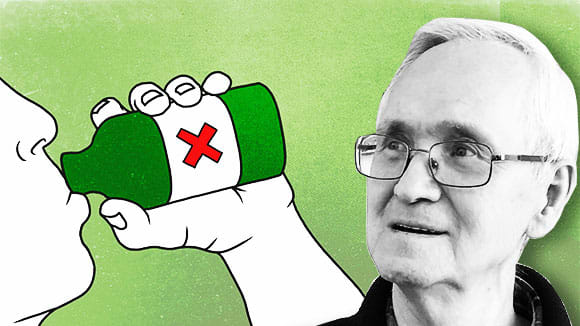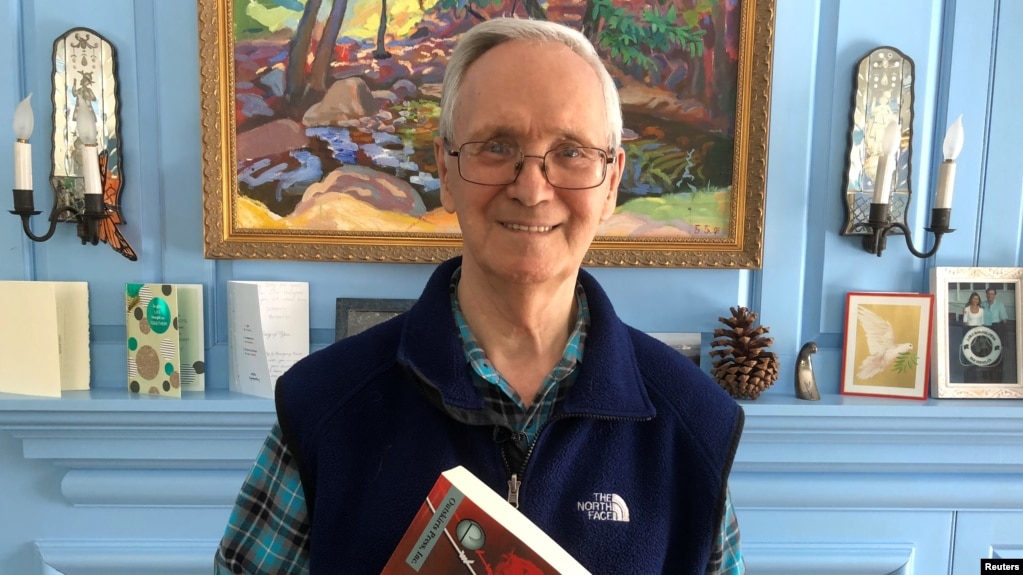Today is the tenth anniversary of our moving to East Raleigh. A lot has happened between then and now but we’re happy to be where we are. It’s a great neighborhood and getting better every day.
March 2018
Howard Jones responds to email
Over the years I’ve had a few email conversations with famous people. I once traded emails with legendary White House Reporter Helen Thomas. I got a reply from an email I sent entrepreneur and Dallas Mavericks owner Mark Cuban in 2005. An email from futurist and biographer Walter Isaacson helped me bust the Einstein Bees story. Oh, and though it’s not email comedian Norm MacDonald briefly followed me on Twitter.
Recently I got on a kick for Howard Jones’s music. Jones was an 80s synthpop god and his music still holds up very well. As does he, since he’s still touring and appears to be happy and healthy. I found Jones’s website and saw that his email address was listed there, with a promise that all emails would be acknowledged:
Hello, Howard.
I know you’re busy but wanted to reach out and thank you for all the
music. Your “Things Can Only Get Better” has been on my mind recently.
We so need its optimism right now.Sorry I missed your latest US tour but I want to catch you the next time
you come near North Carolina.Best to you and yours.
Your fan,
Mark Turner
Raleigh, NC, USA
I got back this reply two days later:
Thankyou Mark!!
Very best wishes
Howard
While it was a short response, it’s pretty cool that he took a minute to respond to me.
Continue reading
Cambridge Analytica: links to Moscow oil firm and St Petersburg university | News | The Guardian
Surprise! Russian-born Cambridge professor Aleksandr Kogan has ties to St. Petersburg and did work for the Russian oil firm Lukoil (if not others). He claims he’s just a scapegoat but he certainly is looking more and more like a key player in Russian election meddling.
I wonder how North Carolina Senator Thom Tillis feels about getting elected with potentially Russian help?
Aleksandr Kogan, the Cambridge University academic who orchestrated the harvesting of Facebook data, had previously unreported ties to a Russian university, including a teaching position and grants for research into the social media network, the Observer has discovered. Cambridge Analytica, the data firm he worked with – which funded the project to turn tens of millions of Facebook profiles into a unique political weapon – also attracted interest from a key Russian firm with links to the Kremlin.Energy firm Lukoil, which is now on the US sanctions list and has been used as a vehicle of government influence, saw a presentation on the firm’s work in 2014. It began with a focus on voter suppression in Nigeria, and Cambridge Analytica also discussed “micro-targeting” individuals on social media during elections.The revelations come at a time of intense US scrutiny of Russian meddling in the 2016 US presidential election, with 13 Russians criminally charged last month with interfering to help Donald Trump.
In Britain, concerns about Russian propaganda have been mounting, with the prime minister, Theresa May, recently attacking Russia for spreading fake news, accusing Moscow of attempts to “weaponise information” and influence polls.
Lukoil, Russia’s second-largest oil company, discussed with Cambridge Analytica the data company’s powerful social media marketing system, which was already being deployed for Republican Ted Cruz in the US presidential primaries and was later used to back Brexit and Trump.
Source: Cambridge Analytica: links to Moscow oil firm and St Petersburg university | News | The Guardian
Aleksandr Kogan: The psychologist at the centre of Facebook’s data scandal, Europe News & Top Stories – The Straits Times
In a video published online in September, a social scientist named Alex Spectre made an earnest pitch for his new startup.Clad in the Silicon Valley uniform of open-collar shirt and blazer, Spectre boasted that his company – Philometrics – would revolutionise the way online surveys were done, making it easier for companies to design questionnaires that people would actually respond to on Facebook, Twitter or other sites.
Crucially, he said, the surveys could predict the responses for large groups from a small number of respondents and micro-target ads better.”The reality is working with big data, social media is incredibly difficult,” said Spectre, who more commonly goes by Aleksandr Kogan, which he uses in his role as a Cambridge University researcher.
“You want to work with people who have a lot of experience. You want to connect with people who have been working with these massive data sets.”
Kogan would know. On Friday (March 16), he was suspended by Facebook Inc. for his earlier work mining data on what the New York Times reported was as many as 50 million Facebook users and sharing it with Cambridge Analytica, a political-advertising firm that helped Donald Trump win the 2016 US presidential election.
Facebook caught spying on conversations again
I was in need of wheelbarrows for a company project two weeks ago, so I pulled up the webpage for the Lowe’s hardware store on my work computer and perused their offerings. A day later, just like magic, Facebook presented me with a Facebook ad from Lowe’s featuring the same brand of wheelbarrows I looked at! The social media company made the connection between my work computer and my personal phone, even though I was not logged into Facebook on my work computer when I made the search. Apparently I had left some Facebook cookies behind on my work computer and Lowe’s webpage uses Facebook integrations to read those cookies.
Creepy? Perhaps for some, but at least I can understand how this magic was done. I might not necessarily like Lowe’s sharing my searches with Facebook but I understand how and why it happened. I chalk this up to good, clean, targeted advertising. It’s fair game.
But there’s apparently another, more nefarious kind of targeted advertising done by Facebook, whether or not they care to admit it. A friend had lunch with a colleague yesterday and they were waiting for their meals when his colleague casually mentioned that his car was in need of a new ignition coil. Upon returning to his office, my friend checked Facebook and was astounded to find a Facebook ad for an ignition coil!
What are the odds of this happening by chance? I mean, I know that a recent story on this by Digg has pointed to the Baader-Meinhof phenomenon as a possible explanation. This theory might apply to more common phrases or objects, like cat food, but ignition coils? How often does anyone ever utter the words “ignition coil” in their lifetime? Saying I hear it maybe once every ten years would be generous. It’s pretty damn uncommon phrase.
My friend insists that he never searched for ignition coils, typed it in, or did anything active that would’ve drawn the ad to him. He also was not on any WiFi networks at the restaurant and had no other overt ties to his colleague and their conversation. While it may be possible his colleague Googled it at the restaurant my friend doesn’t think so, and certainly he didn’t use my friend’s phone to do it. The odds against this being coincidence are simply staggering.
I’ve seen the video of the couple who talked about dog food and summoned dog food ads to their Facebook page. That’s interesting to be sure, but I don’t know these people the way I know my friend. I can certainly vouch for my friend’s honesty.
The Facebook app has been banned from my phone since I caught it using the photos on my phone that I didn’t share to send me ads. That was too creepy for me, but it appears that listening in on what people say now feeds the social media giant’s insatiable appetite to know everything about you.
Are you frightened yet?
Russian spy: This is how nerve agent Novichok destroys your mind and body, even if you survive | The Independent
If Sergei and Yulia Skripal survive being poisoned by Novichok nerve agent, they may be left suffering illnesses that ruin their lives – which may be the point of the attack, security experts have warned.
The case of a Russian military scientist accidentally exposed to Novichok appears to show that even surviving the effects of the supertoxic nerve agent is horrific.
Andrei Zheleznyakov was said to have been injected with an antidote almost immediately, but a friend said he still went from being a jovial, creative man to suffering “chronic weakness, toxic hepatitis, epilepsy, severe depression and an inability to concentrate”, before dying five years later.
Soviet Scientist Who Developed Novichok Poison Used on Sergei Skripal: ‘I’m Sorry’
The person who understands the effects of novichoks best is Vil Mirzayanov, a scientist and later head of Foreign Technical Counterintelligence at the State Scientific Research Institute of Organic Chemistry and Technology (GosNIIOKhT) in Moscow in the 1970s and 1980s, which allegedly produced the shadowy class of binary nerve agents known as the “novichoks” (newcomers). And he has a message for Skripal and his daughter: my bad.
“I’d tell him [Skripal] that I’m very sorry that I participated in the development of these weapons,” Mirzayanov told The Daily Beast.
GosNIIOKhT scientists developed the agents under a program codename “Folio” beginning in the 1980s. Mirzayanov spoke out about the covert program as the Soviet Union fell, earning him a prison term at home before he escaped to exile in the United States.
During the Cold War, the idea that a novichok agent would be used in a covert assassination seemed alien to Mirzayanov and his fellow scientists. The weapons, developed in intense secrecy by Soviet scientists, were originally designed for use in bombs and shells on a battlefield rather than a cloak-and-dagger assassination in a suburb in southern England.
“I couldn’t imagine. No one could imagine. It’s outrageous. We were convinced at the time that we were developing these weapons and testing others for the protection of the country and for defense,” Mirzayanov said. “It was not our goal. None of the scientists supposed that it would be used with terrorist goals. It was a military thing. It was a weapon for mass killing.”
Source: Soviet Scientist Who Developed Novichok Poison Used on Sergei Skripal: ‘I’m Sorry’
American General In Syria Confirms US Forces Killed Hundreds Of Russians In Massive Battle – The Drive
Remember that rumor of a Russian attack on U.S. forces in Syria? Apparently it’s more than a rumor.
I’m not sure what Putin was thinking here. Did he think he could get away with it?
A senior U.S. general appears to have confirmed that hundreds of Russians fought – and died – in a major battle against American forces and their local counterparts in Syria. More importantly, U.S. Army Brigadier General Jonathan Braga, director of operations for the main U.S. military task force in charge of operations in Iraq and Syria, said he feared the situation could have escalated into an all-out conflict with Russia, something we at The War Zone have warned repeatedly is becoming a worryingly realistic possibility.
Braga gave the surprisingly candid account of what had happened to NBC’s Richard Engel, who traveled with the general to visit the exact site of the incident in Syria and to see what the U.S. military was doing to improve its defensive posture.
Ex-Russian Chemical Weapons Specialist: Moscow Was Sure No One Would Find Poison
Vil Mirzayanov is a Russian emigre to the U.S. and chemical weapons specialist who helped develop the poison believed to have been used in the attack in Britain on Sergei Skripal, a former colonel in the GRU, Russia’s military intelligence, and his daughter Yulia.
Mirzayanov spoke with VOA’s Russian service.
Q: You were involved in the development of unique Soviet chemical toxic substances of nerve agent, “Substance 33,” “A-232” and “?-234,” known today as “Novichok” (Newcomer). At the same time, you claim that no other country in the world except Russia has ever had such weapons. How were British investigators able to establish what kind of substance was used to poison Sergei Skripal?
Mirzayanov: To establish which chemical agent was used in this case, you need to have access to a powerful high-resolution mass spectrometer, in the library of which are the spectra of all known compounds. The sample taken is compared with those already known, and the computer indicates a spectrum with a 96 percent probability. That is, there can be no error here.
Source: Ex-Russian Chemical Weapons Specialist: Moscow Was Sure No One Would Find Poison
Ominous biosecurity trends under Putin
Regimes of all types throughout history have sought to harness science for war. As a result, otherwise beneficial technology can become ‘dual-use’. Biological weapons are among the starker examples: research meant to save lives is used to take them. Now, in the run up to elections in Russia, and with concerns mounting about the nation’s role globally, biological-weapons specialists Raymond Zilinskas and Philippe Mauger deliver Biosecurity in Putin’s Russia.
Bioweapons research in Russia and its environs extends back as far as 1928. It took off in the 1970s, for example through the infamous clandestine Biopreparat network. There, the Soviets weaponized pathogens including the smallpox and Marburg viruses and the anthrax bacterium Bacillus anthracis. Zilinskas and Mauger focus on the years 2012–16, when political tensions between Russia and the West intensified markedly. Concerned by apparent shifts in Russia’s pronouncements and actions regarding dual-use activities related to biosecurity, Zilinskas and Mauger write that they wish to “move the discussion over Russian compliance concerns to the public sphere”, where an evaluation based on evidence becomes possible.









